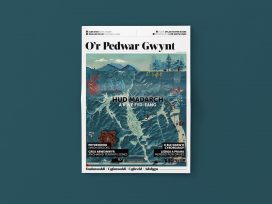
Writing is a known tool for healing trauma. And poetry lends itself to rapid responses under pressure. Forced into migrating to flee war, many Ukrainian women turn to the short form as a call of solidarity, a weapon and solace.
In a world saturated with information, stimuli and industrialized noise, silence can be a reprieve – a vital force that is at least as clear as the ‘loud’ slogans raised at protests and rallies.
‘I want to come to you and be silent for a minute or two.’ In the fourth of Hugues C. Pernath’s index poems from his 1973 collection My Countervoice, time is not just an expression of desire. Lines such as ‘This morning, or tomorrow evening / Or according to the truth’, ‘The youth I paid for with typed phrases’ or ‘Others / Out of whom nothing remained’ scatter the reader’s sense of time. At the end of the poem, redemption beckons when the lyrical ‘I’ unequivocally expresses desire – to come to you and be silent for a minute or two. Every time I read this poem by Pernath, I think of silence as a delicate ritual of self-awareness and connection. At the same time, it confronts me with how difficult it is to talk about silence, because it is a strange beast with sensory and other meanings.
‘Clarity was deception to him,’ Hugo Claus wrote of Pernath in the impressive cycle of poems titled Pernath’s tomb (1977). In Pernath’s oeuvre, the path to self-knowledge is littered with a kind of subdued maximalism, in which the poet creates a fragile but colourful language that reflects his discontent. The melding of surreal associations and a multitude of ellipses in unusual sentence structures point the reader to the isolation that can be found in many of his poems. Of all the poets I enjoy reading, it is Pernath that I most associate with silence. His work has often been described as ‘hermetic’ because there is persistent trouble on the wire between him and the reader. Pernath seems to perhaps not fully understand himself either. The static is never completely eliminated, but it is food for the imagination and the ear.
This perceived impenetrability is not always well received. In 1960 the Dutch reviewer Marten ten Hoor admitted in Books Abroad, the forerunner of World Literature Today, that he did not understand Pernath’s experimental poetry at all. In his review of the collections De adem ik (1959) and Het Uur Marat (1958), ten Hoor also quotes two unnamed literary critics. One calls Pernath’s poetry ‘premeditated exhibitionism’, while the other says it ‘suggests a non-existent clarity’. It is not nothing. Poets who refuse to give up an inch of their ‘navel gazing’ sometimes face harsh criticism.
‘I want to come to you and be silent for a minute or two’ – the line also appeals to me because the restlessness that hangs over the poem seems to thin out in those few minutes of silence. It evokes moments of shared silence with people I love. People with whom you can share moments of idleness. Such moments stand in sharp contrast to the laundry list of things I want to get done in a day, to the noise of the city, the cacophony of notifications, the din of an uncertain world. Could it be that the vitality of silence is more subtle than that of sounds, words, images and actions?
Night is the first thing that comes to mind when I think of silence – sometime after midnight, when I no longer hear the voices of my upstairs and/or downstairs neighbours, and the squeaky lift door on my floor no longer signals the presence of people in the hallway. At this hour, no dog barks when strangers set off fireworks nearby on a weekday, long after the celebrations of New Year have passed. Apart from the occasional wail of sirens and the sound of cars pulling out, the night is remarkably quiet in the part of Koekelberg where I live.
The world is simply loud, and people are porous. We walk through the city with noise-cancelling headphones or earpods, listening to some music or a podcast over the muffled sounds of construction and road works, vehicles, fellow human beings – a cheat code that tames the urban bustle. Or almost, because here and there, you will undoubtedly pick up snippets of overlapping conversations. Or, before the pull of your own screen takes over again, you might catch a glimpse of funny videos on someone else’s phone screen. The World Health Organization tells us that the situation is serious: noise pollution is the second biggest threat to our health in Europe, after air pollution. For city dwellers like me, escaping from anthropophony, the patchwork of sounds arising from human activity, is vital.
This constant exposure is not only detrimental to our physical well-being but also threatens the world of natural sounds and its accessibility, says soundscape ecologist and musician Bernie Krause. For forty years Krause has travelled the world making recordings of nature reserves and some 15,000 animal species. Krause’s lifework has seen him collect more than five thousand hours of sound clips, which together form an auditory canvas of biophony, the collective sound made by non-human organisms. The loss of the ‘chorus of the natural world’ that Krause has recorded over the years is a long and slow process, but it is undeniable. It is tragic that this very antidote to the excess noise produced by modern humanity is being lost. After all, these are the sounds that strengthen our connection to the rich acoustics of the natural world, which have helped shape our imaginations, our cultures and our appreciation of the miracle of life since time immemorial.
The political charge of silence becomes particularly poignant when we see how political actors count on (collective) silence and apathy regarding the industrialized world’s impact on nature, or political violence in places like Palestine, Congo and Myanmar. This is the kind of silence that demagogues of all stripes feed on, making them so fearless that they try to convince you that you can no longer trust your own ears and eyes. The damage of this silence is immense, because it reinforces injustice and inequality, and makes us complicit in the erosion of our common humanity and moral values. It is a silence that isn’t in service of any cause or anyone.
In response to this, there is also room for a committed silence. A silence that rings as loud and clear as the many rallies and protests that have taken place over the past year in defiance of the normalization of poisonous ideas. For the time being, committed silence is less susceptible to repression and censorship designed to silence dissident voices. Small, less visible yet tangible acts of solidarity come to mind, such as contributing to relief funds, caring for vulnerable people and communities, extending a hand, or spreading information through social media (where still possible), and even mourning and rejoicing. Committed silence is also the quiet strength of the survivor in difficult circumstances, when hope seems almost impossible. The mysterious effect of silence in a world awash with information and stimulation should not be underestimated. It can even be transformative. The difficulty of understanding silence and recognizing its many faces need not be a source of discomfort. It can also be the space in which we throw off the yoke of narratives.
This article was first published by Eurozine partner journal rekto:verso. Its translation from Flemish Dutch into English was commissioned as part of Come Together, a project leveraging existing wisdom from community media organization in six different countries to foster innovative approaches.

Published 22 April 2025
Original in Dutch
Translated by
Koba Ryckewaert
First published by rekto:verso (Flemish original); Eurozine (English version)
Contributed by rekto:verso © Hugues Makaba Ntoto / rekto:verso / Eurozine
PDF/PRINTSubscribe to know what’s worth thinking about.

Writing is a known tool for healing trauma. And poetry lends itself to rapid responses under pressure. Forced into migrating to flee war, many Ukrainian women turn to the short form as a call of solidarity, a weapon and solace.

‘O’r Pedwar Gwynt’ delves into the transformative world of fungi, considers arguments against civic nationalism, and interviews one of the founders of the Wages for Housework movement.